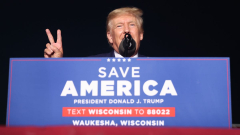It’s unusual for a national figure like Trump to take such interest in primaries or state-level races; he’s trying to reshape the GOP into a movement focused on devotion to him rather than ideology.

- Trump’s vehicle for this is a fundraising machine called Save America.
- Save America reached deepest into Michigan, backing nine candidates in primaries for legislative seats.
- In Arizona, Save America candidates for governor and secretary of state both won their primaries.
Angela Rigas stayed outside the Capitol when she attended the Jan. 6, 2021 rally that turned into an insurrection, and she could not have been prouder to be there.
“It was the most amazing sight that I have ever, ever taken in, and I hope to God I will remember that image for the rest of my life,” Rigas said. “The pride of being an American, the pride of showing up and letting the government know that ‘you need to put yourself in check.’”
When she announced her candidacy for the Michigan state House at a gathering for her state’s chapter of the ultra-conservative Constitution Party, she told them why she was at the Capitol in the first place: “They can try to take our country away in an election, but we’ll take it back however we can.”
Rigas’ previous political activism involved defying pandemic lockdown restrictions, a move that put her hair-cutting license in jeopardy. Now, with backing from former President Donald Trump, she’s the Republican nominee in a district so deeply red that she’s all but assured to take office.
Save America: Trump committee raised millions to fight election fraud before Jan. 6
It may be unusual for a national figure such as Trump to take such interest in a primary, let alone in such a low-level race, but that’s exactly what he is doing.
Without being a candidate for any federal office, he is trying to reshape the Republican Party into a movement focused on devotion to him rather than to ideological principles.
At the top of the agenda for the former president is enlisting loyalists to help him settle his grievances over his loss in the 2020 presidential race. Several experts likened the political playbook to those used by authoritarian leaders.
Trump’s vehicle for this is a fundraising machine called Save America. Started just after he lost the 2020 election and at the height of his efforts to overturn the results, the PAC’s surrogates routinely send out misinformation including conspiracy theories about the 2020 election and the FBI’s search of Trump’s Florida estate, Mar-a-Lago, to rake in donations from the public. It operates like a veritable slush fund, paying for personal expenses like luxurious hotels and even a fashion designer.
Lawyers, Arizona candidates, more: How Trump’s PAC spent almost $4M in July
The money given directly to the candidates by Save America — usually $5,000 each — pales in comparison to Save America’s spending on lawyers who represent Trump in ongoing investigations and barely tops what the PAC spent to commission the former president and first lady’s portraits to hang in the Smithsonian. Instead, the donation is a lever that the former president can pull on to encourage loyalty and exert influence.
The scope of the effort is wide and deep: Save America has backed 28 candidates for state office in nine states. In three of those states, Save America has backed candidates for state legislature, a level virtually unheard of for a PAC of a former high-ranking federal official. At the federal level, Save America has backed candidates for 131 seats in the House and 18 seats in the Senate. The vast majority are election deniers.
And they’ve been largely successful. Two-thirds of Save America candidates running at the state level won their primaries, including all of them in Arizona and Texas. All but a handful of the PAC’s federal candidates have advanced from their primaries and will be on the ballot Nov. 8.
Smithsonian donation: Portraits of Trump, Melania among latest spending for Save America PAC
Reaching deep into the Wolverine State
Save America reached the deepest into Michigan. The PAC backed nine different candidates in their primaries for state legislative seats, the most of any state, plus candidates for attorney general and secretary of state. The group even funded a ballot initiative.
In addition to being a hotbed for challenging the results of the 2020 election — ranging from a legal challenge in Antrim County to unsubstantiated claims about Dominion Voting Systems machines — Michigan also has what state officials have called “the most decentralized election system in the nation.”
Enter Rachelle Smit, the township clerk in a village of 400 in southwestern Michigan who says her first-hand knowledge of running elections informs her view that 2020 was a “failed election.” She is one of four Save America-backed legislative candidates in Michigan who won her primary.
Who is Tudor Dixon?: Four things to know about Michigan’s GOP nominee for governor
“Michigan is being wrecked by a tyrannical dictator,” Smit said in a campaign ad. “As the township clerk of Martin, I knew something wasn’t adding up when precincts across the nation stopped counting late at night, and that just doesn’t happen. I too feel the frustration with our so-called leaders in Lansing ignoring their duty to uphold the constitution and kowtow to special interests.”
Jonathan Lindsey, a U.S. Army special forces veteran running for state Senate, puts the claims on his webpage. “Instead of a fair election, we saw one that was not conducted legally, was open to manipulation and fraud, and that resulted in many reports of irregularities,” his site reads.
The endorsement statement from Save America called Lindsey a “warrior” who is “tough on election integrity.”
Save America went 2-0 in primary endorsements for statewide campaigns in Michigan. Both winners have centered their campaign around the 2020 election and won endorsements from the former president and Save America that endorse their experience with alleged election fraud.
Kristina Karamo: Anti-vaxxer, election denier, against evolution education. And, in Michigan, perhaps secretary of state
Kristina Karamo, Save America’s candidate for secretary of state, alleged on Fox News in 2020 that she had witnessed improper handling of ballots in Detroit. Her campaign account also posted a video alleging that a woman in it was fraudulently signing absentee ballots on behalf of others.
Matthew DePerno, Save America’s attorney general candidate, represented a Michigander in the infamous case against Dominion Voting systems, the elections software and hardware maker, in Antrim County. He has also been accused by state investigators working for the sitting attorney general of tampering with voting machines after the election.
A state agency has appointed a special prosecutor to review whether DePerno and others should face charges related to voting machine tampering. DePerno dismisses the issue as the work of a “the most corrupt AG in the country” seeking to influence his election.
Presidents don’t usually do this
Candidates in Michigan continually frame Democratic Gov. Gretchen Whitmer as a dictator, but experts say the one edging toward authoritarianism is Trump himself, even though he does not have a formal position to carry out his plans and has not declared his candidacy for any federal office.
“It’s common for those who want to be authoritarians or strongmen to do anything they can to create issues with elections and question the legitimacy of elections, especially when an election is not going their way,” said Jodi Vittori, co-chair of the global politics and security concentration at the School of Foreign Service at Georgetown University.
Rusty Hills, lecturer in public policy at the University of Michigan and former chair of the Michigan Republican Party, said there’s nothing unusual about presidents getting involved in elections, but they usually do so on behalf of the party in the general election, after voters have decided who the party nominee will be.
‘Can I count on you?’: Trump revs up fundraising pitches after FBI’s Mar-a-Lago search
“In the case of Donald Trump, he’s engaged just as much if not more often within primaries and conventions and nominating contests,” Hills said. “So he’s trying to pick out who are the right kinds of Republicans.”
Going all the way down to the state level is even more unusual, he said.
“Most presidents don’t get to that granular level of detail,” he said. “That’s getting pretty far in the weeds.”
Lawrence Rosenthal, the chair of the Center for Right Wing Studies at UC Berkeley, agreed that it’s “very unusual for a national PAC of this level of renown to be supporting at the level of state offices.” He said the overall goal is to formalize the blueprint from the 2020 election.
Vittori, who specializes in monitoring corruption and democracies, described the significance of reaching so deep into state elections.
“They’ve begun the process of putting loyalists in key offices, including low-level offices Republicans never really paid attention to,” Vittori said, noting that Trump has also talked about replacing civil service workers. “Whether he’s doing it, or advisors are doing it, they are really running an authoritarian playbook. They really understand where the rules of the game are and the large loopholes in our laws. You can undermine democracy by doing things that are technically legal, but have never been done before.”
Melania’s designer: Trump PAC paid $60K to Herve Pierre Braillard
Batting 1.000 in Arizona
Save America batted 1.000 in Arizona, where candidates for governor and secretary of state both won their primaries, as did one incumbent and one newcomer in the state Senate. Money funneled through a state-level PAC also helped defeat another Trump opponent.
Former Arizona representative Anthony Kern, who won his primary for state Senate, has tweeted baselessly that there is “ample evidence” to prove that Trump won the 2020 election. He has also called for Arizona not to use Dominion Voting Systems machines, often blamed without evidence for allowing fraud during the 2020 election, for the 2022 midterms.
In Save America’s endorsement of Kern, Trump wrote that he already pushed out a so-called RINO, or Republican in name only — a state senator who originally supported the state Senate’s audit of the 2020 election but then called the audit’s results embarrassing — and that Kern is “an incredible fighter for election integrity.”
State Sen. Wendy Rogers, a self-described member of the Oath Keepers who builds her profile through Telegram and other social media, has repeatedly told followers, “I want the routers” in reference to Arizona’s election systems.
It’s an echo of what Trump said in 2020, when he called for the network routers that he claimed without evidence allowed fraudulent votes. An audit of the routers found no fraud and no connection to the internet and ballot tabulation. After the audit, Rogers tweeted: “The machines were connected to the internet and the elections workers tampered with the machines. The truth is the truth.”
Aside from direct candidate contributions, Save America donated $200,000 to a PAC called the Arizona First Project, which spent $98,000 in a state Senate primary opposing Arizona House Speaker Rusty Bowers, who testified in front of the Jan. 6 committee against Trump’s efforts to overturn the 2020 election, and supporting former state Sen. David Farnsworth. (Another $81,000 went to supporting Save America’s candidate for governor.)
Farnsworth was one of 29 Arizona legislators who in December 2020 asked Vice President Mike Pence to accept a slate of alternate, fake electors in favor of Trump. He has run his campaign in part on his promise to o





